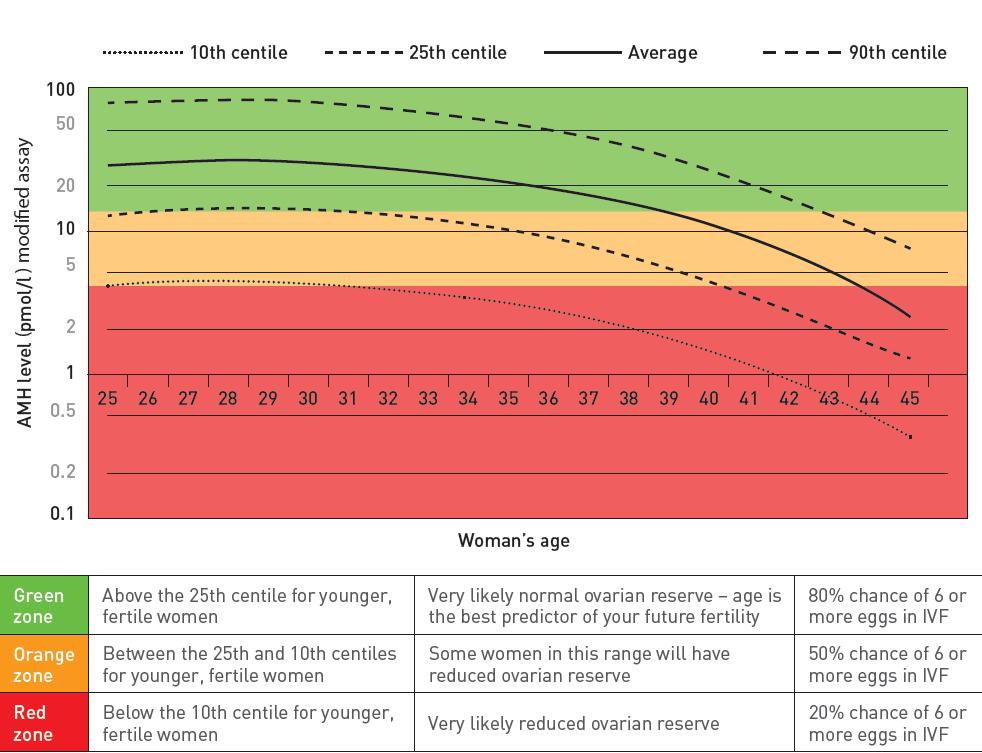What is AMH?
AMH, or Anti-Müllerian Hormone, is a protein hormone produced by the granulosa cells in the ovarian follicles. These follicles are small sacs within the ovaries that contain immature eggs. The amount of AMH in your blood correlates with the number of these follicles, making it a reliable indicator of your ovarian reserve — the number of eggs remaining in your ovaries.
Unlike other hormones involved in the menstrual cycle, AMH levels remain relatively stable throughout the month, making it a convenient marker to measure at any time.
Why Are AMH Levels Important?
AMH levels are crucial for several reasons:
- Assessing Ovarian Reserve: AMH gives doctors an idea of how many eggs you have left, which helps evaluate your fertility potential.
- Predicting Menopause: Low AMH levels can signal the approach of menopause, while higher levels suggest a longer reproductive window.
- Planning Fertility Treatments: For individuals undergoing treatments like IVF, AMH levels help doctors determine the best course of action, including how your ovaries may respond to stimulation.
- Diagnosing Conditions: Abnormal AMH levels may point to conditions like Polycystic Ovary Syndrome (PCOS) or primary ovarian insufficiency (POI).
What Are Normal AMH Levels?
AMH levels are measured in nanograms per milliliter (ng/mL) and vary by age. Here’s a general guide:
- 20-30 years: 1.5 – 4.0 ng/mL
- 31-40 years: 1.0 – 3.0 ng/mL
- Above 40 years: 0.5 – 1.5 ng/mL
It’s important to note that these numbers are averages, and individual results can differ. Your doctor will interpret your levels in the context of your age, health, and fertility goals.
Low AMH Levels: What Does It Mean?
Low AMH levels indicate a reduced ovarian reserve. While this can be a concern for individuals trying to conceive, it does not necessarily mean you cannot get pregnant. Other factors, such as egg quality and overall health, also play critical roles in fertility.
If your AMH levels are low, your doctor may recommend lifestyle changes, supplements, or specific fertility treatments to improve your chances of conception.
Tips to Address Low AMH Levels:
- Prioritize a nutrient-rich diet
- Stay physically active
- Consult with a fertility specialist for tailored advice
High AMH Levels: What Does It Mean?
High AMH levels may indicate a larger ovarian reserve, but they can also be a sign of PCOS. While having a higher number of follicles sounds beneficial, PCOS can disrupt ovulation and complicate the journey to pregnancy. A thorough evaluation by a healthcare provider can clarify the situation and guide you toward the best treatment options.
How to Manage High AMH Levels:
- Work with your doctor to address PCOS-related concerns
- Monitor ovulation patterns
- Adopt a balanced lifestyle to regulate hormones
How to Check Your AMH Levels
Preparing for the Test:
- No fasting is required
- Inform your doctor of any medications you are taking
- Discuss your fertility goals beforehand
What Can You Do to Improve AMH Levels?
While AMH levels naturally decline with age, certain lifestyle changes and medical interventions can support your ovarian reserve:
- Healthy Diet: A diet rich in antioxidants, healthy fats, and whole foods can promote hormonal balance.
- Stress Management: Chronic stress can negatively impact fertility. Practices like yoga, meditation, or acupuncture can help.
- Avoid Toxins: Limit exposure to environmental toxins that can harm egg health.
- Consult Your Doctor: Supplements like DHEA or CoQ10 might be recommended to improve egg quality and support ovarian function.
Final Thoughts
AMH is a powerful tool in understanding your fertility. Whether you’re planning for the future or actively trying to conceive, knowing your AMH levels can provide clarity and help you make informed decisions about your reproductive health.
At Lifegate Acupuncture, we’re here to guide you through every step of your fertility journey. From AMH education to tailored acupuncture treatments, we’re committed to helping you achieve your goals.
Ready to take control of your fertility?
Contact us today to learn more about how we can support you!


